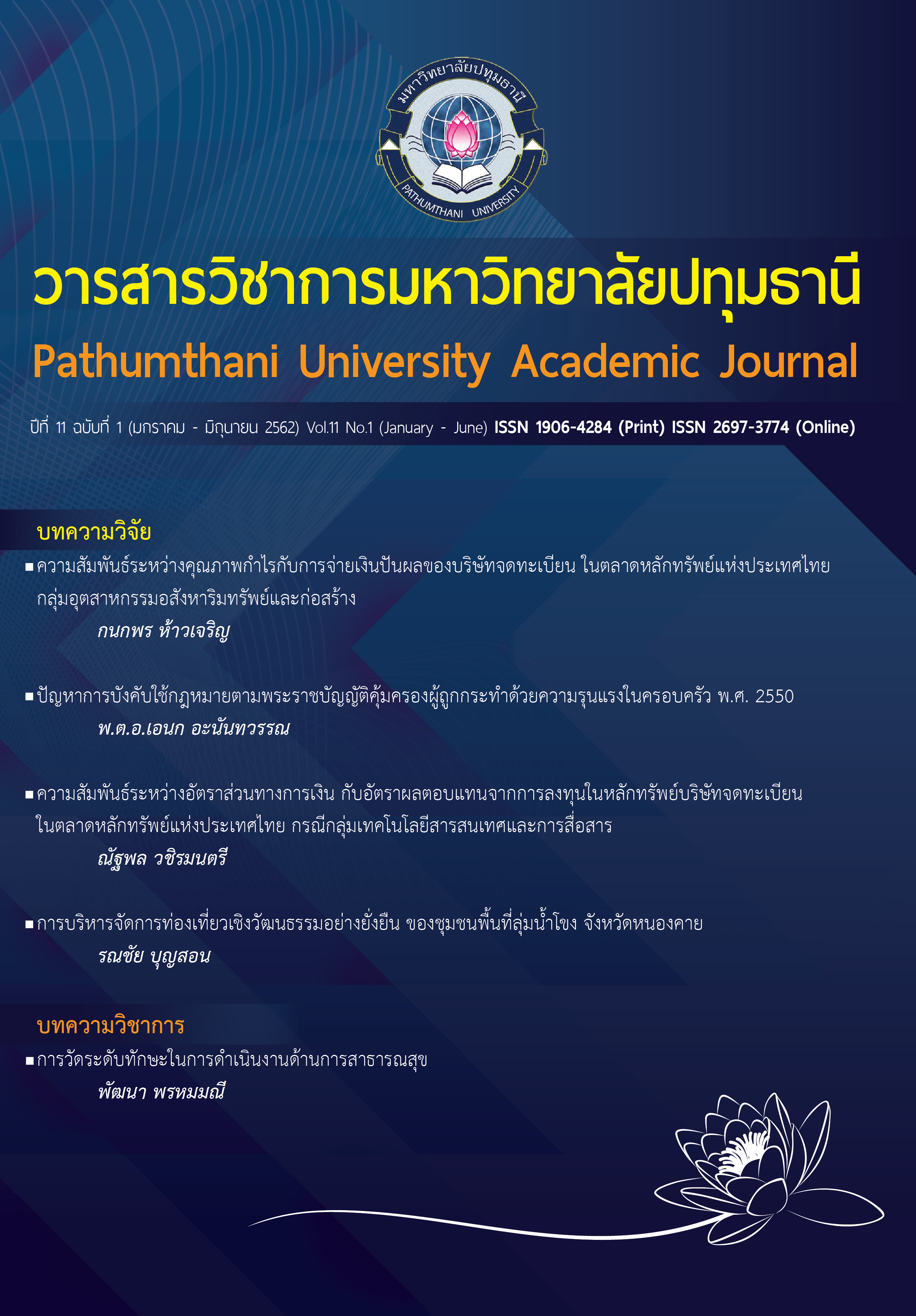The Relationships Between Perceived Job Characteristics, the Extrovert Personality Trait, Locus of Control and the Psychological Well-Being of Registered Nurses at Piyavate Hospital.
Keywords:
Job Characteristics, the Extrovert Personality Trait, Locus of Control, Psychological Well-BeingAbstract
In this thesis, the researcher examines (1) perceived job characteristics, the extrovert personality trait, locus of control, and the psychological well-being of selected registered nurses at Piyavate Hospital. The researcher also studies (2) the relationships between perceived job characteristics, the extrovert personality trait, locus of control, and the psychological well-being of these nurses. Finally, furthermore, the researcher frames (3) a predictive equation governing the psychological well-being of these nurses with perceived job characteristics, the extrovert personality trait, and locus of control as predictors. The sample population consisted of 110 registered nurses at Piyavate Hospital. The research instruments consisted of a questionnaire eliciting demographical characteristics data, a questionnaire used to measure psychological well-being, a questionnaire appertaining to perceived job characteristics, a questionnaire measuring the extrovert personality trait, and a questionnaire involving locus of control. Using techniques of descriptive statistics, the researcher analyzed the data collected in terms of percentage, mean (M), and standard deviation (SD). Pearson’s product moment correlation coefficient (PPMCC) method and multiple regression analysis (MRA)—involving successive applications of the forward selection technique—were also employed by the researcher. Findings are as follows: 1. Perceived job characteristics, the extrovert personality trait, and locus of control were found to be correlated with the psychological well-being of the nurses at the statistically significant level of .05.
- The variable of perceived job characteristics was the only variable that was predictive of the psychological well-being of the nurses at the statistically significant level of .05. The prediction of psychological well-being was determined to hold at 24.9 percent.
References
สถาบันพัฒนาและรับรองคุณภาพโรงพยาบาล. (2547). รายงานประจำปี 2547. นนทบุรี: ผู้แต่ง.
สุภาพร เหมือนละม้าย. (2555). การรับรู้ความสามารถของตนเอง คุณลักษณะงาน บรรยากาศองค์การที่ส่งผลต่อความผูกพันในงานของพยาบาลวิชาชีพของโรงพยาบาลแห่งหนึ่ง. วิทยานิพนธ์วิทยาศาสตรมหาบัณฑิต, มหาวิทยาลัยรามคำแหง.
หัทยา ศรีวงษ์. (2554). ความสัมพันธ์ระหว่างลักษณะงาน ความสามารถในการทำงาน และบรรยากาศองค์การกับความสุขในการทำงานของพยาบาลหน่วยงานอุบัติเหตุ-ฉุกเฉิน โรงพยาบาลชุมชนในเขตภาคกลาง. วิทยานิพนธ์พยาบาลศาสตรมหาบัณฑิต, มหาวิทยาลัยบูรพา.
Compton, W. C. (2005). Introduction to positive psychology. Belmont, CA: Wadsworth.
Costa, P. T., Jr., & McCrae, R. R. (2000). Revised NEO personality (NEO-PI-R) and NEO Five-Factor for Inventory (NEO-FFI) professional manual. Odessa, FL: Psychological Assessment Resources.
Diener, E., Emmons, R. A., Larsen, R. J., & Griffin, S. (1985). The satisfaction with life scale. Journal of Personality Assessment, 49, 71-75.
Furnham, A., & Cheng, H. (2003). Personality, peer relation, and self-confidence as predictor of happiness and loneliness. Journal of Adolescence, 25, 327-339.
Glazer, S., Stetz, T., & Izso, L. (2004). Effects of personality on subjective job stress: A cultural analysis. Personality and Individual Differences, 37, 645-658.
Hackman, J. R., & Oldham, G. R. (1980). Work redesign. Boston: Addison-Wesley.
Ryff, C. D., & Singer, B. H. (1996). Psychological well-being: Meaning, measurement, and implications for psychotherapy research. Psychother Psychosom, 65(1), 14-23.
Wright, T. A., & Bonett, D. G. (2007). Job satisfaction and psychological well-being as nonadditive predictors of workplace turnover. Journal of Management, 33(2), 141-160.
Xie, J. L., (1992). Moderating and mediating effects in job design. Journal of Management, 18(4), 657-676.
Downloads
Published
How to Cite
Issue
Section
License
บทความที่ได้รับการตีพิมพ์เป็นลิขสิทธิ์ของวารสารมหาวิทยาลัยปทุมธานี
ข้อความที่ปรากฎในบทความแต่ละเรื่อง เป็นความคิดเห็นส่วนตัวของผู้เขียน กองบรรณาธิการไม่จำเป็นต้องเห็นด้วยเสมอไป และไม่มีส่วนรับผิดชอบใด ๆ ถือเป็นความรับผิดชอบของผู้เขียนแต่เพียงผู้เดียว



